Social Media Harm in Teenagers
- Last Updated: June 12th, 2025

Attorney Jessie Paluch, founder of TruLaw, has over 25 years of experience as a personal injury and mass tort attorney, and previously worked as an international tax attorney at Deloitte. Jessie collaborates with attorneys nationwide — enabling her to share reliable, up-to-date legal information with our readers.
Legally Reviewed
This article has been written and reviewed for legal accuracy and clarity by the team of writers and legal experts at TruLawsuit Info and is as accurate as possible. This content should not be taken as legal advice from an attorney. If you would like to learn more about our owner and experienced injury lawyer, Jessie Paluch, you can do so here.
Fact-Checked
TruLawsuit Info does everything possible to make sure the information in this article is up to date and accurate. If you need specific legal advice about your case, contact our team by using the chat on the bottom of this page. This article should not be taken as advice from an attorney.
Key Takeaways:
- The rise of social media has been linked to mental health issues in teens, including depression, anxiety, and low self-esteem due to unrealistic comparisons and cyberbullying.
- Almost 90% of teenagers use social platforms, raising concerns as excessive screen time is associated with negative psychological effects and possibly addictive behavior patterns.
- Parents can help mitigate the risks by setting clear online usage guidelines, promoting a balance between digital and offline life, fostering open communication about internet safety, and providing access to mental health resources.
Social Media Harm in Teenagers
On this page, we’ll discuss Social Media Harm in teenagers, how parents can protect their teens against Social Media Harm, who qualifies to file a Social Media Harm Lawsuit, and much more.
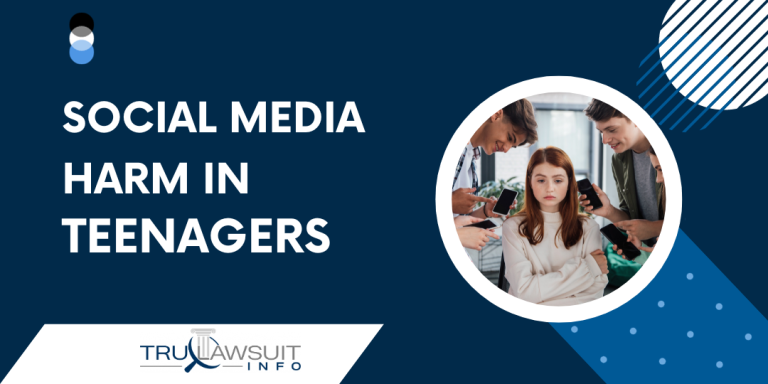
Intro To Social Media Harm Lawsuits
The Social Media Harm Lawsuit alleges that Meta knowingly designed and deployed harmful features on Instagram, Facebook, and its other social media platforms that purposefully addict children and teens.
The manipulative features allegedly used by Meta include:
- Algorithms designed to keep users on the platform longer;
- Incessant alerts meant to induce young users to return to Meta’s platforms constantly;
- Visual filter features known to promote body dysmorphia in young users; and
- Other various social comparison features.
If you or a loved one has experienced harm due to the use of social media, you may qualify to file a Social Media Harm Lawsuit.
Contact TruLawsuit Info today using the chat on this page to receive an instant case evaluation.
Table of Contents
Does Social Media Do More Harm Than Good?
The question of whether social media does more harm than good is complex, with research suggesting both positive and negative impacts.
While it can provide platforms for connection and emotional support, excessive use is associated with increased risk for depression, anxiety, loneliness, self-harm, and suicidal thoughts.
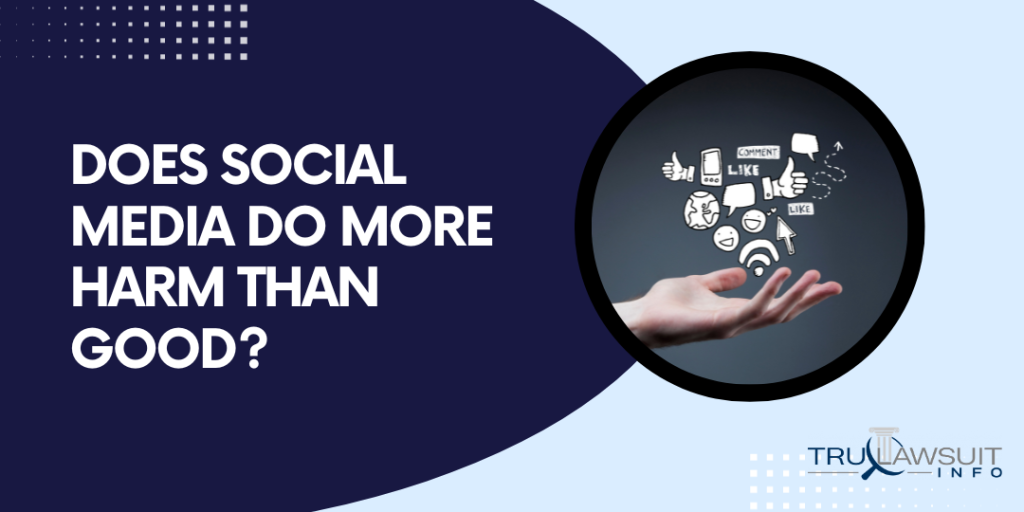
Critical aspects of social media’s impact on youth mental health includes, but is not limited to:
- The positive aspects of social media
- The negative effects of excessive social media use
- Strategies for minimizing harm and maximizing benefits
The Positive Aspects of Social Media
Social media has revolutionized how we communicate and stay connected with others.
It has made it possible for people to maintain relationships regardless of geographic distance, and it can provide a platform for individuals to seek emotional support and express their identities.
However, it’s important to balance these benefits with the potential risks:
- Social media can foster a sense of community and shared identity
- It can be a source of emotional support and validation
- It allows for the maintenance of relationships across distances
The Negative Effects of Excessive Social Media Use
While social media can have positive impacts, excessive use can have detrimental effects on mental health.
Multiple studies have shown a strong link between heavy social media use and an increased risk for depression, anxiety, loneliness, self-harm, and even suicidal thoughts.
Here are some key insights into these negative effects:
- Social media can promote feelings of inadequacy about one’s life or appearance
- It can lead to decreased productivity and decreased face-to-face social interactions
- It can be addictive, leading to increased usage and potential mental health issues
Strategies for Minimizing Harm and Maximizing Benefits
Given the potential risks associated with excessive social media use, it’s important to implement strategies to minimize harm and maximize benefits.
This can include reducing time spent on social media, focusing more on offline activities, and using social media in a mindful and intentional way.
Here are some strategies to consider:
- Reduce time spent on social media
- Focus more on offline activities and real-world connections
- Use social media in a mindful and intentional way
While social media can offer significant benefits, such as fostering community and providing emotional support, excessive use can lead to mental health issues.
Therefore, it’s important to use social media mindfully and implement strategies to minimize potential harm.
How Does Social Media Affect Teenagers?
While these platforms can offer a space for self-expression and a meaningful connection, they also present significant challenges to adolescents’ well-being.
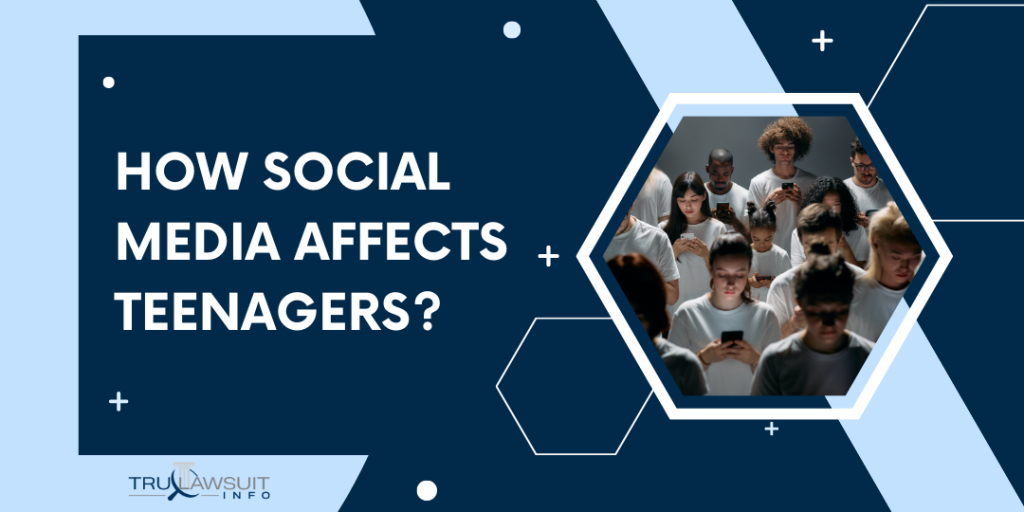
Social media has been linked to cyberbullying, depression, anxiety, low self-esteem, and disrupted sleep in teenagers.
However, it can also provide social support and serve as a platform for self-expression and identity formation.
Here’s a detailed look at the effects of social media on teenagers:
- Mental Health Implications
- Impact on Self-Esteem
- Online Safety and Protection
Mental Health Implications
The use of social media has been associated with various mental health issues in teenagers.
The U.S. Surgeon General’s advisory on Social Media and Youth Mental Health highlights that excessive use can lead to depression, anxiety, and low self-esteem.
Key effects on mental health include:
- Depression and Anxiety: Excessive use of social media can lead to heightened feelings of depression and anxiety.
- Cyberbullying: Social media platforms are often used for cyberbullying, which can have severe psychological impacts.
- Sleep Disruption: Excessive screen time, especially before bed, can lead to disrupted sleep patterns, which are essential for teenage brain development.
Impact on Self-Esteem
Social media can significantly impact the self esteem of teenagers.
Seeing others looking perfect online can lead to feelings of inadequacy and lowered self-esteem.
Key points include:
- Comparison with Peers: Teenagers may compare themselves with their peers or celebrities, which can lead to a negative self-image.
- Perceived Social Status: Likes, comments, and shares often determine social status on these platforms, affecting self-esteem.
- Unrealistic Expectations: Social media often portrays an idealized version of life, leading to unrealistic expectations, dissatisfaction, and low self-esteem.
Online Safety and Protection
Online safety is a significant concern when it comes to teenagers and social media use.
As per the U.S. Surgeon General’s advisory, it is crucial to ensure the online safety of young people.
Key points include:
- Exposure to Harmful Content: Teenagers are often exposed to biased or inappropriate content on social media.
- Privacy Concerns: Teenagers may not fully understand the privacy settings on social media, leading to potential risks.
- Parental Involvement: Parents can help protect their teenagers from negative effects by monitoring their online activities and setting limits.
Parents, educators, and policymakers need to understand these impacts and take necessary steps to ensure online safety and mental wellbeing.
What Is the Connection Between Social Media Use and Teen Mental Health?
Understanding how social media harms and affects teenagers sets the stage for exploring its deeper connection to their mental health.
Psychological research continually points to a troubling trend: excessive use of social media sites can significantly contribute to poor mental health among adolescents.
This is particularly evident in instances where teens report feelings of anxiety and low self-esteem that correlate with the amount of time they spend scrolling through various platforms.
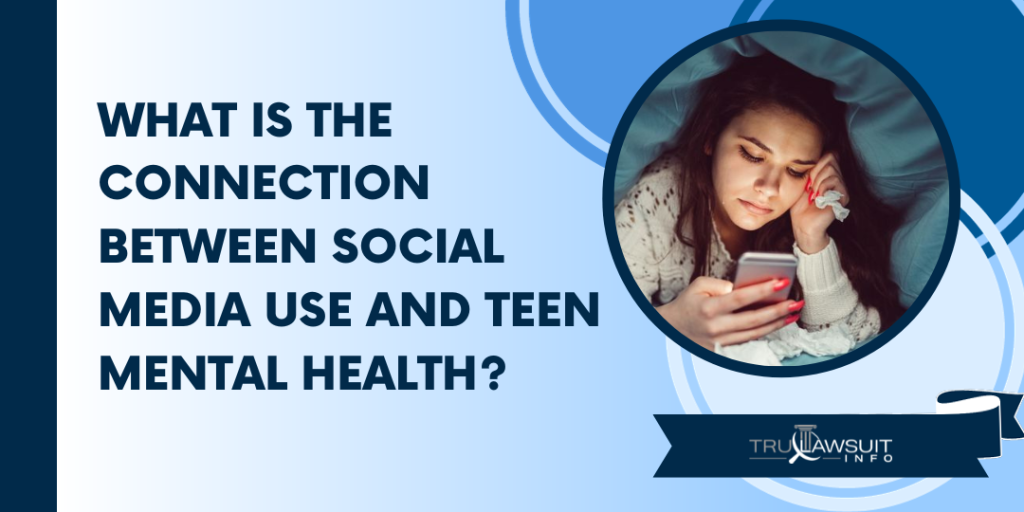
As they navigate this digital world, teenagers are bombarded with images and messages that often distort reality, setting unrealistic standards for body image and lifestyle.
The challenges don’t stop there — adolescent girls especially may find themselves wrestling with negative influences from other social media users, which can lead them down a path towards disordered eating or even self-harm in severe cases.
Social support systems, once found in real life, are becoming overshadowed by the lure of online interactions that might seem meaningful but often lack depth and genuine social connection.
The line between healthy social media use and potential addiction blurs easily, making it critical for both public health initiatives and individual family media plans to address these risks proactively.
Parents play an instrumental role by teaching kids about responsible habits on social media apps and sites while monitoring for signs of excessive usage or negative feelings stemming from online experiences.
What Are Effective Strategies for Preventing Social Media-Related Harm in Teens?
In an era where social media is a dominant aspect of teenage life, understanding and mitigating its potential negative impacts is crucial.
Parents, educators, and caregivers have a significant role in guiding teens toward a healthier engagement with social media.
Recognizing Behavioral Changes
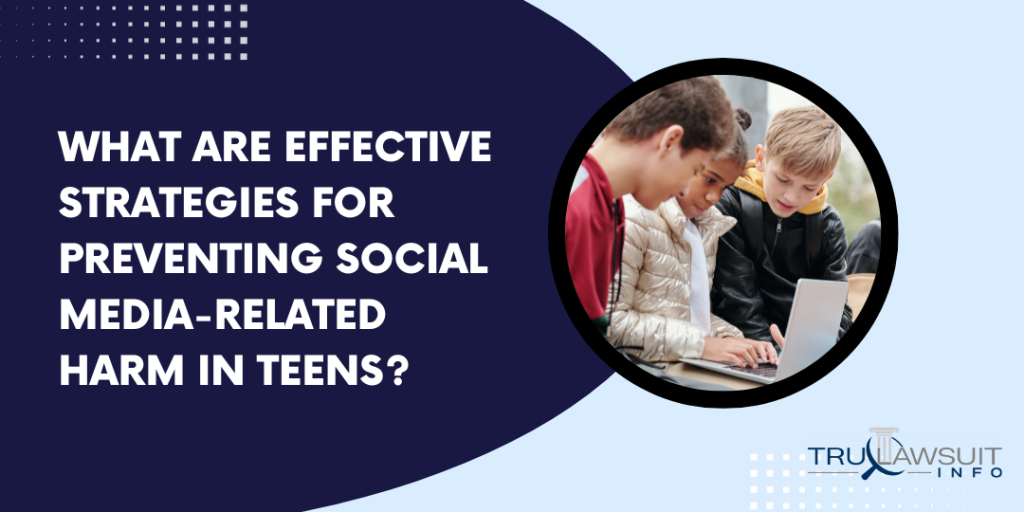
Identifying changes in teen behavior is a critical first step in mitigating social media harm. These changes can be diverse and sometimes subtle.
To prevent social media-related harm in teens, the following effective strategies can be implemented:
- Encouraging open communication between parents and teens to foster a supportive environment for discussing online experiences and concerns.
- Promoting digital literacy and critical thinking skills to help teenagers discern between reliable and harmful content on social media platforms.
- Setting limits on screen time and promoting a healthy balance between online activities and other offline interests and responsibilities.
- Educating teens about the potential risks of excessive social media use, including cyberbullying, exposure to harmful or inappropriate content, and its impact on mental health.
- Collaborating with educators to integrate mental health education into school curriculums, addressing the effects of social media on emotional well-being.
- Providing access to professional mental health support and resources for both parents and teenagers to address any negative impacts of social media use on mental health effectively.
Engaging in Teens’ Online World
Deep engagement in a teen’s online world is more than just monitoring; it’s about understanding and participating in their digital life.
This approach helps in nurturing trust and better communication.
Extended strategies for effective engagement:
- Take an active interest in the platforms and content they are engaging with, and discuss the nature of these platforms and their content critically;
- Educate them about online safety, privacy, and the importance of maintaining a healthy digital footprint;
- Share experiences and insights about responsible social media use, highlighting both its benefits and potential pitfalls;
- Encourage them to be content creators who contribute positively to the online community rather than just passive consumers.
Addressing Specific Social Media Risks
Certain social media platforms, particularly those focusing on visuals, can pose significant risks.
These platforms often intensify issues related to body image, anxiety, and peer pressure.
Comprehensive measures to address these risks:
- Engage in open conversations about the unrealistic standards often portrayed in social media, especially regarding body image and lifestyle;
- Highlight the importance of authenticity and self-acceptance in a world driven by curated online personas;
- Discuss the impact of social comparison and the pressure to conform to certain standards or trends;
- Encourage them to follow diverse accounts that promote positive body image, mental health awareness, and genuine content.
Encouraging Healthy Offline Activities
Encouraging teens to engage in offline activities is vital for their overall development.
It helps in establishing a healthy balance between the virtual and real world.
A few offline strategies to encourage social media moderation include:
- Fostering hobbies and interests that are unrelated to the digital world, such as sports, music, art, or community service;
- Planning family activities or outings that require engagement with the natural environment or real-world tasks;
- Setting clear guidelines for ‘unplugged’ times, where the focus is on face-to-face interactions and physical activities;
- Encouraging them to develop skills and hobbies that can be pursued without digital interference, emphasizing the value of experiences over online validation.
How Can Parents Protect Their Teens Against Social Media Harm?
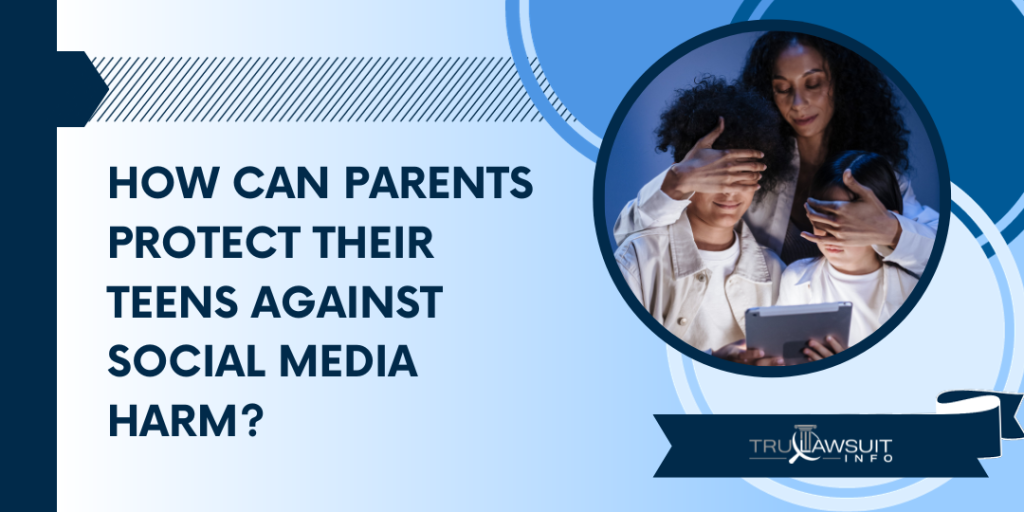
Here are some actionable steps that parents can take:
- Encourage open communication with your teen about their online experiences and concerns, creating a safe space to share any worries or issues they may encounter.
- Establish clear guidelines and boundaries for social media use, including setting limits on screen time and monitoring the platforms they have access to.
- Stay informed about the latest social media trends and challenges to understand better the potential risks your teen may face online.
- Educate your teen about responsible online behavior, maintaining privacy, avoiding cyberbullying, and being cautious about sharing personal information.
- They are fulfilling a healthy balance between offline and digital interactions by encouraging physical activity, hobbies, and face-to-face socialization.
- Set a positive example by modeling healthy tech habits and mindful social media usage within your behavior.
- Implement parental controls or monitoring apps to help track your teen’s online activities and ensure their safety while using social media platforms.
- Seek professional guidance if you notice signs of excessive social media use or negative impacts on your teen’s mental health, providing them with the necessary support and resources.
Why Is Legal Assistance Essential for Teens Facing Social Media Harm?
Teens facing social media harm may require legal assistance to address issues such as online harassment, cyberbullying, online abuse, and exposure to harmful content.
Legal support is essential in holding social media companies accountable for facilitating such harm and seeking remedies for affected teenagers.
Moreover, legal intervention can help teens navigate the complex landscape of privacy laws and ensure their rights are protected in the digital sphere.
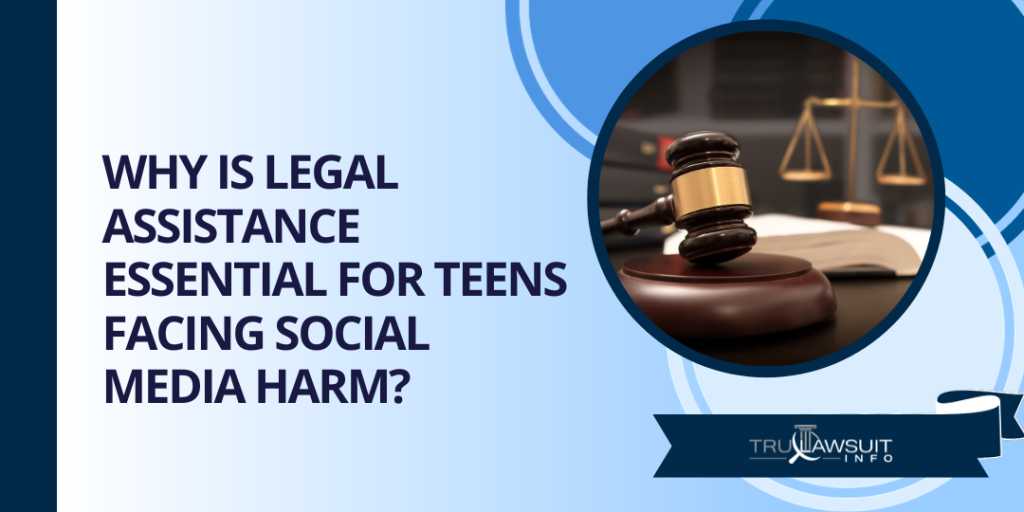
In addressing the impact of negative aspects of social media on adolescents, it’s crucial to acknowledge the necessity of legal guidance for teens who face detrimental consequences due to online experiences.
Seeking appropriate legal assistance can aid in asserting these teenagers’ rights and mitigating potential long-term repercussions from social media-related harm.
How Do You Consult An Attorney For A Social Media Harm Lawsuit?
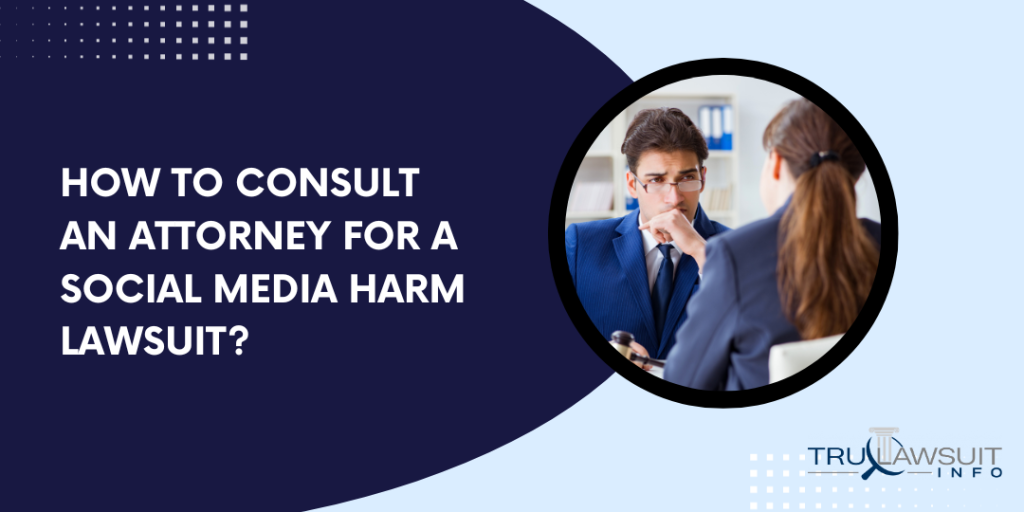
To consult an attorney for a social media harm lawsuit, follow these steps:
- Research Law Firms: Look for law firms experienced in social media harm lawsuit cases and specifically representing teenagers.
- Free Consultation: Contact the law firm to schedule a free consultation to discuss your case and determine eligibility.
- Prepare Documentation: Gather any evidence or documentation related to the harm caused by social media platforms.
- Ask Questions: During the consultation, inquire about the attorney’s experience with similar cases and their approach to representing teenage clients.
- Legal Guidance: Seek legal guidance on the potential outcomes, processes involved, and the timeline for filing a lawsuit.
- Understand Your Rights: Understand your rights as a plaintiff and how the attorney plans to protect them during the legal process.
- Fee Structure: Inquire about the attorney’s fee structure, including any contingency fees or upfront costs for representation.
- Case Strategy: Discuss potential strategies for addressing social media harm and developing a strong legal case.
- Decision Making: After the consultation, consider all information provided before deciding whether to proceed with legal action.
Conclusion
In conclusion, the impact of social media on teenagers’ mental health is substantial.
Effective strategies and open communication channels can minimize negative effects and enhance well-being.
Are you ready to take practical steps to safeguard your teen’s online experience?
You have the power to influence positive change in their digital lives.
Let’s prioritize guiding and protecting our teens for a healthier online environment.
Consider seeking professional advice or legal assistance if necessary, as early intervention is crucial for addressing social media harm effectively.
Frequently Asked Questions
-
Can Social Media Cause Harm To Teenagers?
Yes, teenagers face an increased risk for social media addiction, low self-esteem, and other negative effects on their well-being due to spending too much time on these platforms.
-
What Are The Signs Of Social Anxiety From Social Media Use?
Signs include a strong desire to stay online constantly, feeling anxious when not connected, and avoiding real-life interactions with people, which leads to social isolation.
-
How Can We Help Kids Balance Their Lives And Reduce The Risks Of Using Social Media?
Teach kids healthy habits like mindfulness, practice mindfulness, encourage them to spend time offline with friends and family, and educate them about both positive ways of self-expression and the dangers like rumors spreading online.
-
Are Some Teens More Vulnerable To Social Media Harm Than Others?
Research suggests teenage girls may be more susceptible to issues such as eating disorders or low self-esteem related to frequent use compared with boys.
-
Is There Any Research Linking Teenage Mental Health And Social Platforms?
More research is needed, but associations have been made between extended use of other social media platforms and decreased subjective well-being or life satisfaction among adolescents by sources such as the National Center for Adolescent Health.

Experienced Attorney & Legal SaaS CEO
With over 25 years of legal experience, Jessie is an Illinois lawyer, a CPA, and a mother of three. She spent the first decade of her career working as an international tax attorney at Deloitte.
In 2009, Jessie co-founded her own law firm with her husband – which has scaled to over 30 employees since its conception.
In 2016, Jessie founded TruLaw, which allows her to collaborate with attorneys and legal experts across the United States on a daily basis. This hypervaluable network of experts is what enables her to share reliable legal information with her readers!
Have A Case?
Here, at Tru Lawsuit Info, we’re committed to helping victims get the justice they deserve.
To do this, we actively work to connect them with attorneys who are experts in litigating cases similar to theirs.
Would you like our help?
Tru Lawsuit Info is a reliable source of information about issues that may affect your health and safety, such as faulty products, data breaches, and environmental hazards.
Our team of experienced writers collaborates with medical professionals, lawyers, and advocates to produce informative articles, guides, and other resources that raise awareness of these topics.
Our thorough research provides consumers with access to reliable information and updates on lawsuits happening around the country. We also can connect consumers with attorneys if they need assistance.
Camp Lejeune's water contamination issue spanned several decades starting in the 1950s. Exposure to these chemicals has been linked to various serious health issues, including cancer, organ diseases, and death.
Research is increasingly suggesting a link between the use of Tylenol during pregnancy and the development of neurodevelopmental disorders, such as autism and ADHD, in infants.
Legal action is being taken against manufacturers of Aqueous Film-Forming Foam (AFFF), a chemical used in fighting fires. The plaintiffs allege that exposure to the foam caused health issues such as cancer, organ damage, and birth and fertility issues.
Have A Case?
Here, at Tru Lawsuit Info, we’re committed to helping victims get the justice they deserve.
To do this, we actively work to connect them with attorneys who are experts in litigating cases similar to theirs.
Would you like our help?







